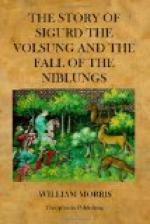And there is the wise-heart Hogni; and his lips are close and thin,
And grey and awful his eyen, and a many sights they win:
And there is Guttorm the youngest, of the fierce and wandering glance,
And the heart that never resteth till the swords in the war-wind dance:
And there is Gudrun his daughter, and light she stands by the board,
And fair are her arms in the hall as the beaker’s flood is poured:
She comes, and the earls keep silence; she smiles, and men rejoice;
She speaks, and the harps unsmitten thrill faint to her queenly voice.
So blossom the days of the
Niblungs, and great is their hope’s increase
’Twixt the merry days
of battle and the tide of their guarded peace:
There is many a noon of joyance,
and many an eve’s delight,
And many a deed for the doing
’twixt the morning and the night.
Now betimes on a morning of summer
that Giuki’s daughter arose,
Alone went the fair-armed Gudrun to her flowery
garden-close;
And she went by the bower of women, and her damsels
saw her thence,
And her nurse went down to meet her as she came
by the rose-hung fence,
And she saw that her eyes were heavy as she trod
with doubtful feet
Betwixt the rose and the lily, nor blessed the
blossoms sweet:
And she spake:
“What ails thee, daughter,
as one asleep to tread
O’er the grass of the merry summer and the
daisies white and red?
And to have no heart for the harp-play, or the
needle’s mastery,
Where the gold and the silk are framing the Swans
of the Goths on the
sea,
And helms and shields of warriors, and Kings on
the hazelled isle?
Why hast thou no more joyance on the damsels’
glee to smile?
Why biddest thou not to the wild-wood with horse
and hawk and hound?
Why biddest thou not to the heathland and the
eagle-haunted ground
To meet thy noble brethren as they ride from the
mountain-road?
Hast thou deemed the hall of the Niblungs a churlish
poor abode?
Wouldst thou wend away from thy kindred, and scorn
thy fosterer’s
praise?
—Or is this the beginning of love and
the first of the troublous
days?”
Then spake the fair-armed
Gudrun: “Nay, nought I know of scorn
For the noble kin of the Niblungs,
or the house where I was born;
No pain of love hath smit
me, and no evil days begin,
And I shall be fain tomorrow
of the deeds that the maidens win:
But if I wend the summer in
dull unlovely seeming,
It comes of the night, O mother,
and the tide of last night’s
dreaming.”
Then spake the ancient woman:
“Thy dream to me shalt thou show;
Such oft foretell but the
weather, and the airts whence the wind
shall blow.”




